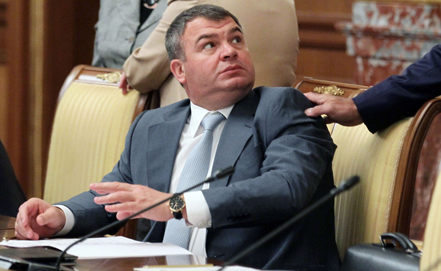
Investigators Harass Serdyukov, While Military Reform Is Stalled
Publication: Eurasia Daily Monitor Volume: 10 Issue: 9
By:

Last November, President Vladimir Putin sacked Defense Minister Anatoly Serdyukov, replacing him with Sergei Shoigu, a former long-time emergency situations minister (MChS), who was only last May appointed governor of the Moscow region. Serdyukov has been disgraced by an inquiry into alleged corruption into the defense ministry–controlled holding company “Oboronservis.” Last week Russia’s Investigative Committee (Slyedstvenny Kommitet Rossye—SKR) revealed that Serdyukov, who was questioned as a witness in the defense ministry corruption investigation, was invoking his constitutional right to keep silent (the 51st article of the Russian constitution—the equivalent of the Fifth Amendment in the United States). The SKR spokesman Vladimir Markin accused Serdyukov of behaving as a person with something to hide. Sources in the SKR told journalists Serdyukov may be indicted, as the investigation continues (Interfax, January 11).
The investigation of corruption in the defense ministry is continuing and widening with daily reports of new searches and arrests. This week, a criminal investigation in the defense ministry’s Red Star Publishing House was announced together with new accusations of defense budget misappropriation and money laundering (Interfax, January 17). The constant flow of compromising allegations (“kompromat” in Russian), implicating defense ministry officials connected to Serdyukov, is given maximum prominence on Russian state TV, which is a clear sign that this “kompromat” campaign has the implicit blessing of the Kremlin. The continued public tarnishing of Serdyukov may be a shrewd political move by the presidential administration to demonstrate that Putin is serious about stamping out high-level corruption plaguing his government. Serdyukov was never a popular figure in Russia, and his disgrace may be seen as an adequate sacrifice to placate an increasingly angry Russian public. But there are serious implications: The costly and radical military reform Serdyukov began in 2008 seems to be going adrift at a most inopportune time, when plans to drastically increase defense spending are being enacted and strategically important decisions must be made.
Since taking over, Shoigu has, up to now, failed to implicitly indicate his strategic priorities in developing the Russian military. The defense ministry is being cleansed of Serdyukov’s top appointees, with Shoigu bringing in some of his old-time colleagues from the MChS (see EDM, January 15). Of course, this is historically a normal procedure in the Russian military defense bureaucracy: each defense minister in the last 20 years has spent up to year or more after appointment cleansing the top military echelon of former top brass and bringing in his own men. The process virtually paralyzes all long-term strategic decision-making and often undermines day-to-day management of Russia’s enormous military machine, since high- and middle-rank officials do not know their own career future or what political guidelines may soon be prioritized, and consequently, they tend to dodge any responsible decisions.
Shoigu has so far reversed some decisions made under Serdyukov on military education. This week, Shoigu organized a video conference of all of the Russian defense ministry top brass to discuss the state of the Russia military. Shoigu announced that he will personally chair such conferences once a month, while his deputies, of which he has ten, will do so on a weekly basis. Such video conferences were normal procedure in the MChS under Shoigu, so he apparently decided to introduce them in the defense ministry. Journalists were allowed to be present during part of the procedure as Shoigu announced that by the end of 2013 the Russian military will terminate the standard issue and use of leg-rags known as “portyanki” in the military: “We will find additional finance and will forget the word ‘portyanki’ (Kommersant, January 15).
The leg-rags or “portyanki” have been in use in the Russian military for centuries—they are wrapped around the foot instead of socks and are cheaper and easier to maintain. In fact, units were issued cloth to make “portyanki” and the solders cut them themselves, reducing costs further. Reportedly, the defense ministry still has enough stockpiled cotton and fleece fabric to make 16 million “portyanki” (Izvestiya, January 15).
Russian soldiers have traditionally been issued boots made of cheap, heavy, smelly and ugly artificial leather known as “kirza” that are virtually impossible to wear with socks. Under existing regulations, while in garrisons, soldiers are allowed to wash only once a week during the so called “washing day” or “banny dieni.” During field deployment for, say, exercises, soldiers could stay unwashed for longer periods. In such conditions socks tend to become smelly faster than “portyanki.” The ability to adequately wrap a leg-rag around the foot and then insert it into a boot that lacks shoelaces requires some experience; Russian conscripts traditionally first acquire lots of blisters before mastering the craft. In 2007, soon after taking over the defense ministry, Serdyukov announced—just like Shoigu did this week—that “portyanki” will be eliminated as the Russian military modernizes and Westernizes. But like much of Serdyukov’s radical reform, mandate did not, apparently, fully materialize (Kommersant FM, January 14).
Russian soldiers are at present being issued Western-style army boots with shoelaces and an array of socks, but the quality and quantity of the boots and socks are still in question. It has been announced that showers will be available to the rank-and-file in the barracks and that the tradition of a once-a-week “washing day” will be terminated (Kommersant FM, January 14). But modernizing and Westernizing Russia is a daunting task. Today, tens of millions of Russians still live outside big cities in housing that lacks running water, flush toilet rest rooms or individual showers. The tradition of a once-weekly “washing day” in a community wash house is very much alive for many Russians, and it is the boys from such rural and small-town areas that mostly form the military. Whereas, boys from Moscow and the big cities generally successfully dodge service. Also, when it is cold in Russia (-20 degrees Celsius or less), traditional boots made out of coarse wool or “valeki” with “portyanki,” tend to be much better than Western-style army boots with socks.
On the verge of indictment and possible arrest, Serdyukov’s current situation is another example of a typical end to a Western-style modernization drive in Russia, as well as a stern reminder to Shoigu and other possible reformers.




